Get-together leads to characters from classic novel finding new life in a popular concert performed Peking Opera-style, Chen Nan reports.
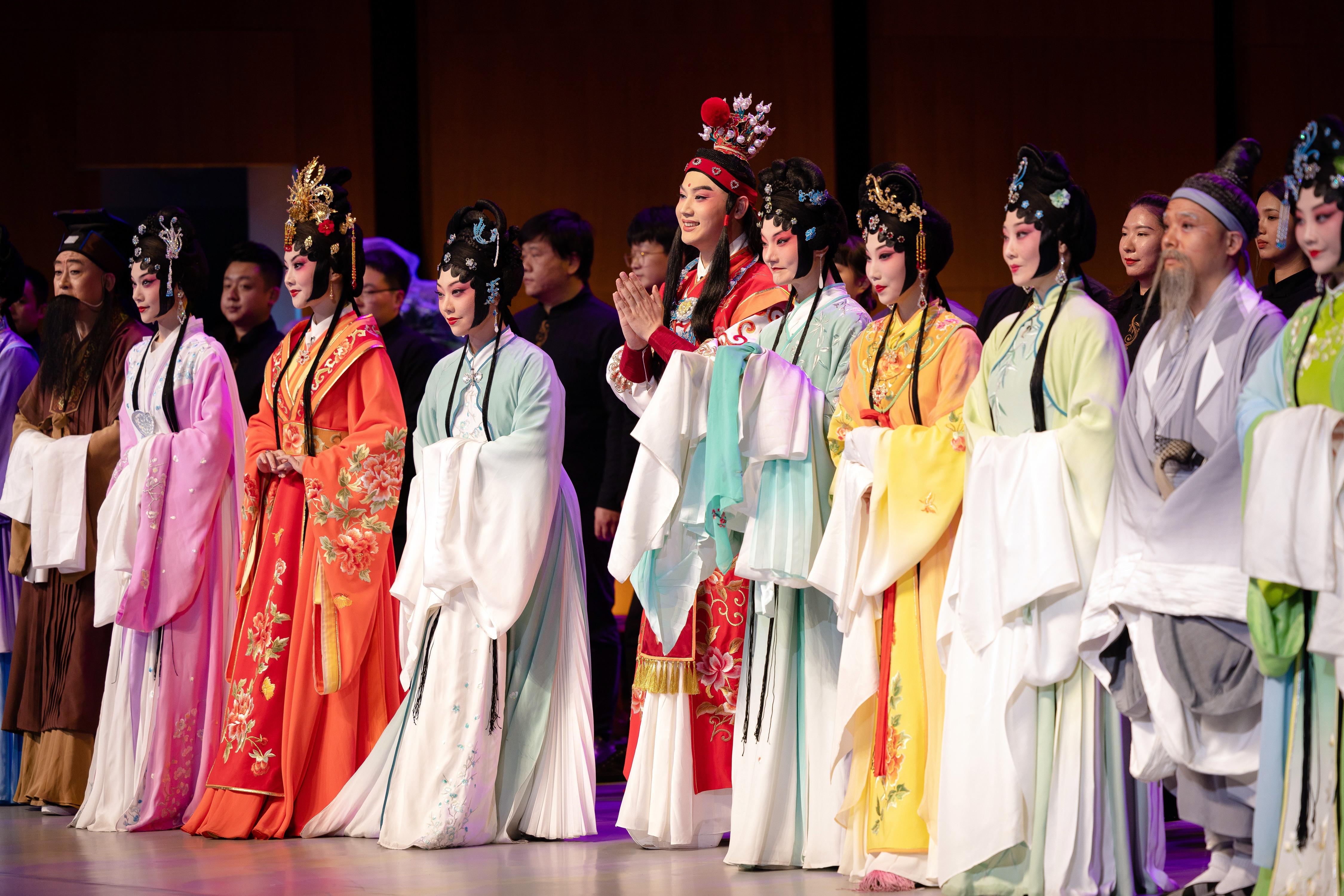 Performers take a curtain call at the premiere. (PHOTO PROVIDED TO CHINA DAILY)
Performers take a curtain call at the premiere. (PHOTO PROVIDED TO CHINA DAILY)
When producer Li Dong, composer Wang Liping and Wei Lingzhi, secretary-general of the Cao Xueqin Society, met at the Cao Xueqin Memorial Hall in the China National Botanical Garden last year, it seemed at first like a casual chat between friends.
But when Wang, who composed the soundtrack for the 1987 Chinese TV series Dream of the Red Chamber, played a few songs students at the National Academy of Chinese Theatre Arts had adapted, Li became excited and the idea for a new project was born.
"The students' songs mixed Peking Opera with Wang's soundtrack, and I felt that it would be a great experience for the audience to enjoy the soundtrack with a new Peking Opera arrangement," says Li.
Wei liked Li's idea, and offered his support by inviting veteran scholars, specializing in the Dream of the Red Chamber and its author Cao Xueqin, to help write the scripts for the performers, and veteran Peking Opera composer Zhu Shaoyu was invited to rearrange Wang's soundtrack.
The result was Jingyun Honglou (meaning "Dream of the Red Chamber, Peking Opera-style"), a concert that premiered at the National Library Arts Center last year.
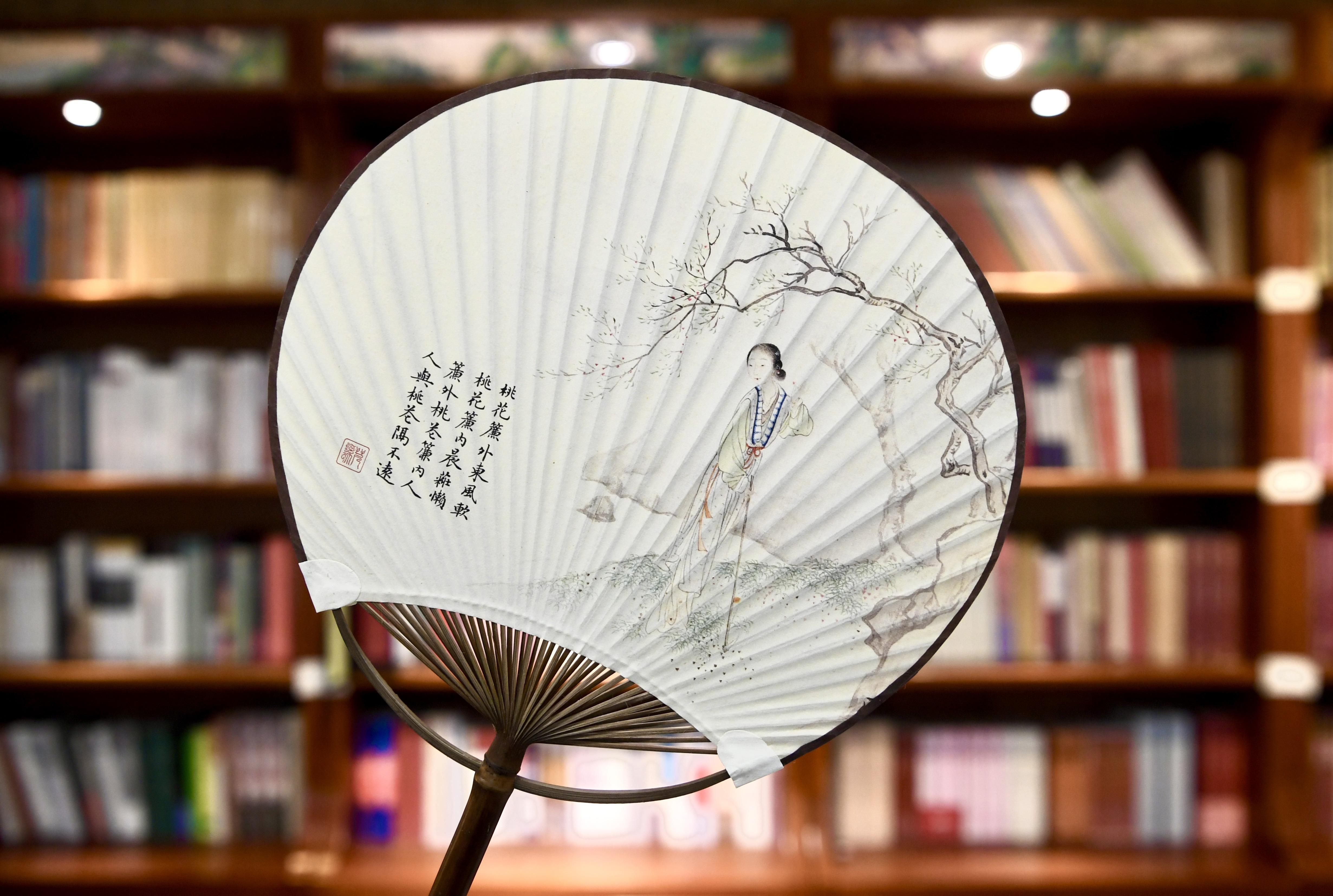 A tuanshan, or round fan, inspired by the characters of Dream of the Red Chamber. (PHOTO PROVIDED TO CHINA DAILY)
A tuanshan, or round fan, inspired by the characters of Dream of the Red Chamber. (PHOTO PROVIDED TO CHINA DAILY)
A year on, the concert will once again be performed at the same venue on Friday and Saturday.
The famous Qing Dynasty (1644-1911) novel, which is considered one of the four masterpieces of Chinese literature, chronicles the downfall of the wealthy and influential Jia family, and is set against a backdrop of social and political upheaval.
When the television adaptation premiered in 1987 on China Central Television, the series and the soundtrack were enormously successful and became a classic. In an early interview, Wang said that it took him four-and-a-half years of continual work to finish the soundtrack and portray the characters through music, during which he had many sleepless nights.
"The story of the Dream of the Red Chamber has been performed many times, in different traditional opera styles. But to present these well-known songs in a Peking Opera style was a first, and it got a warm response from the audience," says Li.
Jingju, another name for Peking Opera, is a 200-year-old art form that combines singing, dancing, acrobatics and martial arts. Different singing styles have been developed over the centuries. Performers from the Jingju Theatre Company of Beijing played the characters in the concert.
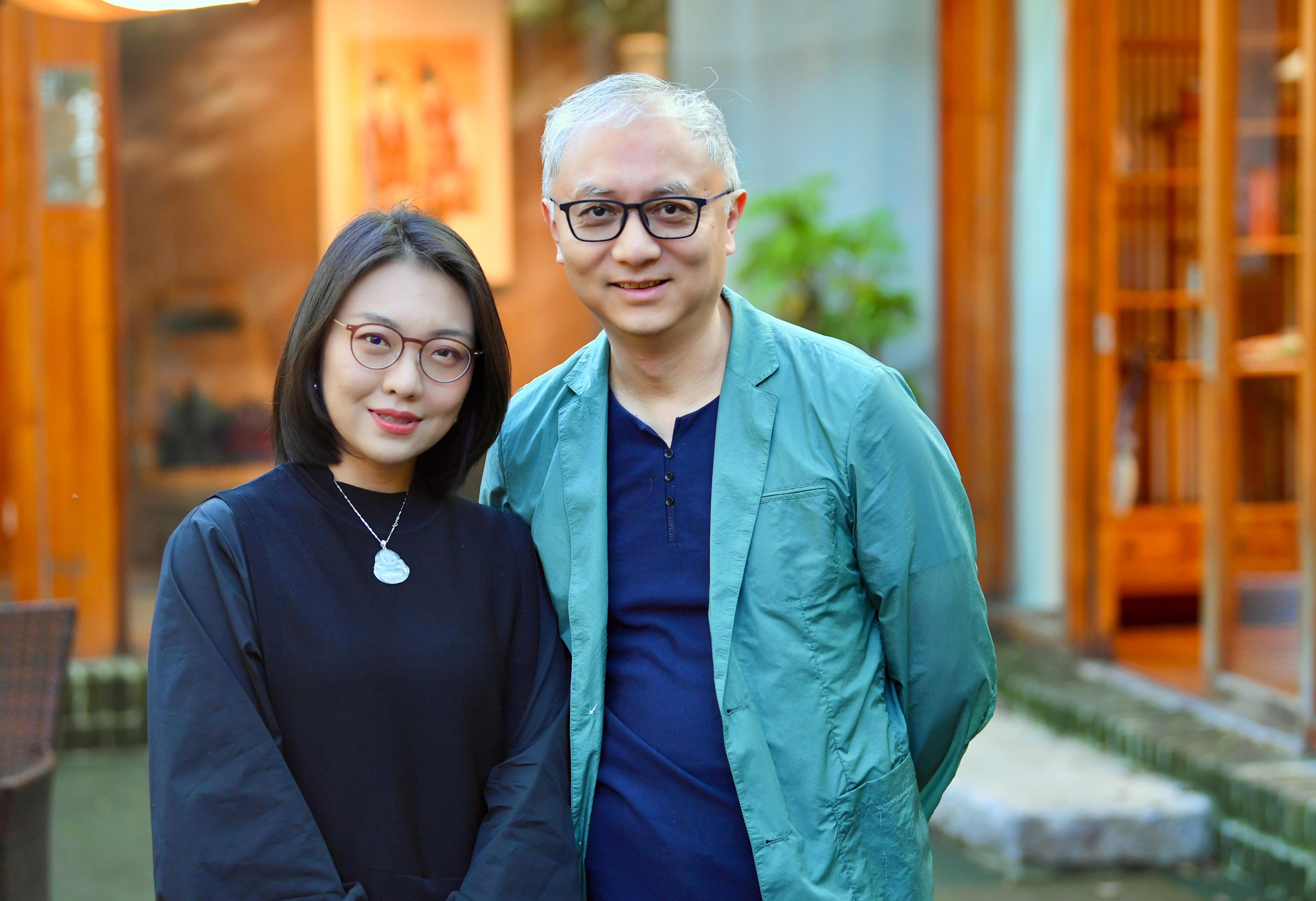 Producer Li Dong (right) and Peking Opera star Zheng Xiao. (PHOTO PROVIDED TO CHINA DAILY)
Producer Li Dong (right) and Peking Opera star Zheng Xiao. (PHOTO PROVIDED TO CHINA DAILY)
The story's lead character, Jia Baoyu, is the link between the songs and alludes to the original plot. For some of the pieces, dance and choral singing helps flesh out scenes from the novel.
"I am a big fan of the novel and of the TV series. I have watched it over and over again, and I can sing all the songs," says Peking Opera actress Zheng Xiao, who plays the role of Lin Daiyu in the concert. "I have been trained in Peking Opera since I was a child. We also have a Peking Opera version of the Dream of the Red Chamber, but this concert follows an innovative format, and I had to rehearse for a long time, which was very challenging."
Zheng says that she reread the novel and restudied the relationships between the characters, especially Lin Daiyu. "She is a sentimental and romantic woman but she is also very independent and determined," Zheng adds.
Dancer-choreographer Wang Yabin, who directed the concert last year, returns again this year. She is no stranger to Peking Opera from years spent working on one of her most famous dance dramas, The Moon Opera, which was based on Bi Feiyu's novel, and which tells the story of a Peking Opera performer called Xiao Yanqiu.
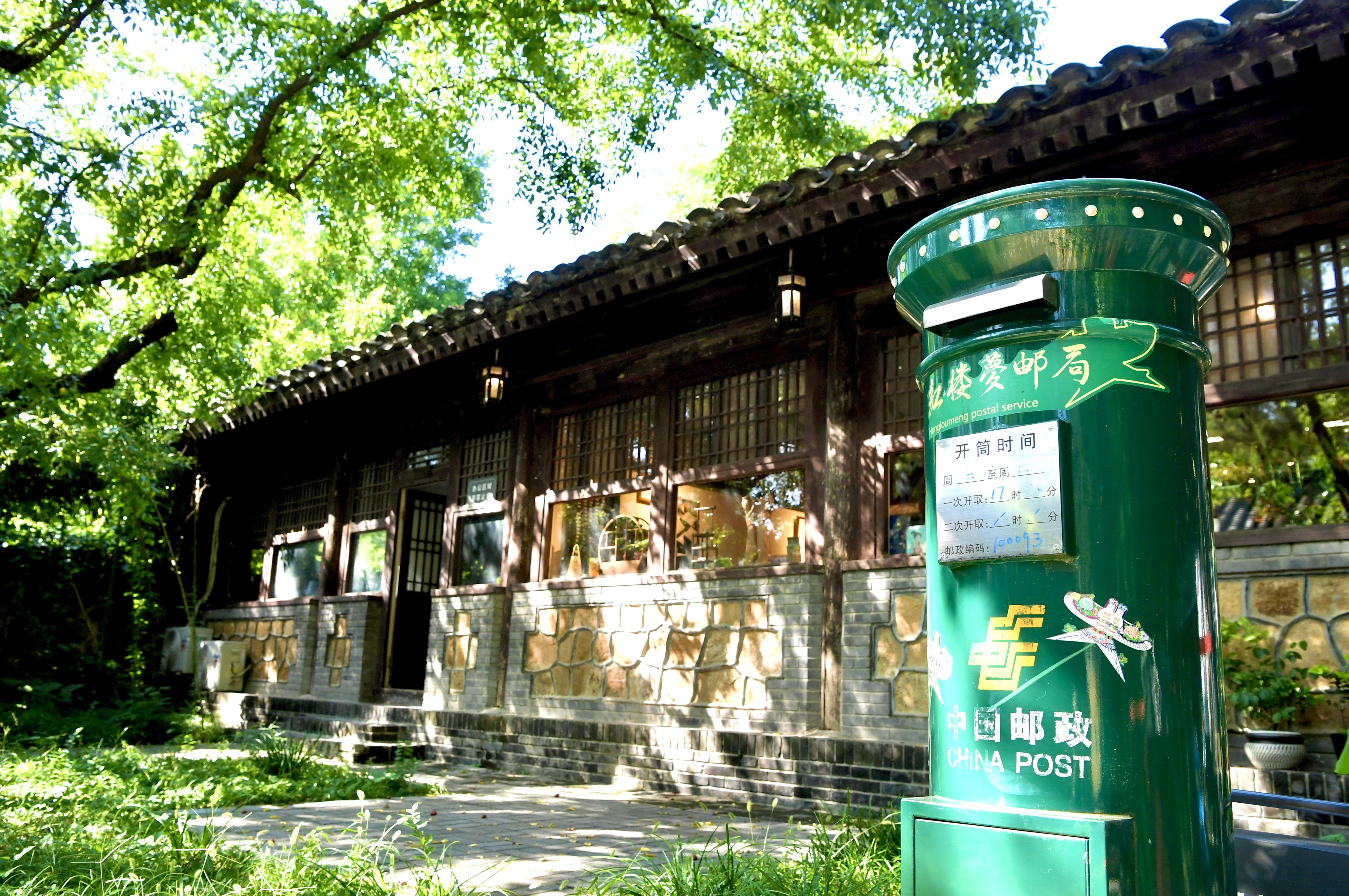 A Dream of the Red Chamber-themed post office, where people can send postcards with images of the characters, at the Cao Xueqin Memorial Hall in Beijing. (PHOTO PROVIDED TO CHINA DAILY)
A Dream of the Red Chamber-themed post office, where people can send postcards with images of the characters, at the Cao Xueqin Memorial Hall in Beijing. (PHOTO PROVIDED TO CHINA DAILY)
"What we tried to do is to present the classic characters from the Dream of the Red Chamber through a combination of music, dance and Peking Opera," Wang Yabin says, adding that both Chinese and Western musical instruments are used in the concert, giving the songs a new twist.
She can still remember the warm response from the audience following the premiere last year. "It was a bold and successful experiment bringing Peking Opera, a national treasure, and a classic TV series together," she says.
According to Wei, the concert is part of the 14th Cao Xueqin Culture and Art Festival, which will open in Beijing on Friday and runs until December. Events will include stage performances, exhibitions and lectures, and experts specialized in the novel will give speeches.
"The significance of the Dream of the Red Chamber goes beyond a novel," says the secretary-general of the Cao Xueqin Society. "It's more like an encyclopedia because it encapsulates the essence of traditional Chinese culture, passed down for centuries. Each time we read it, we learn something new. The novel and its characters have remained alive over the centuries, and have been interpreted through different art forms, including traditional operas and paintings."
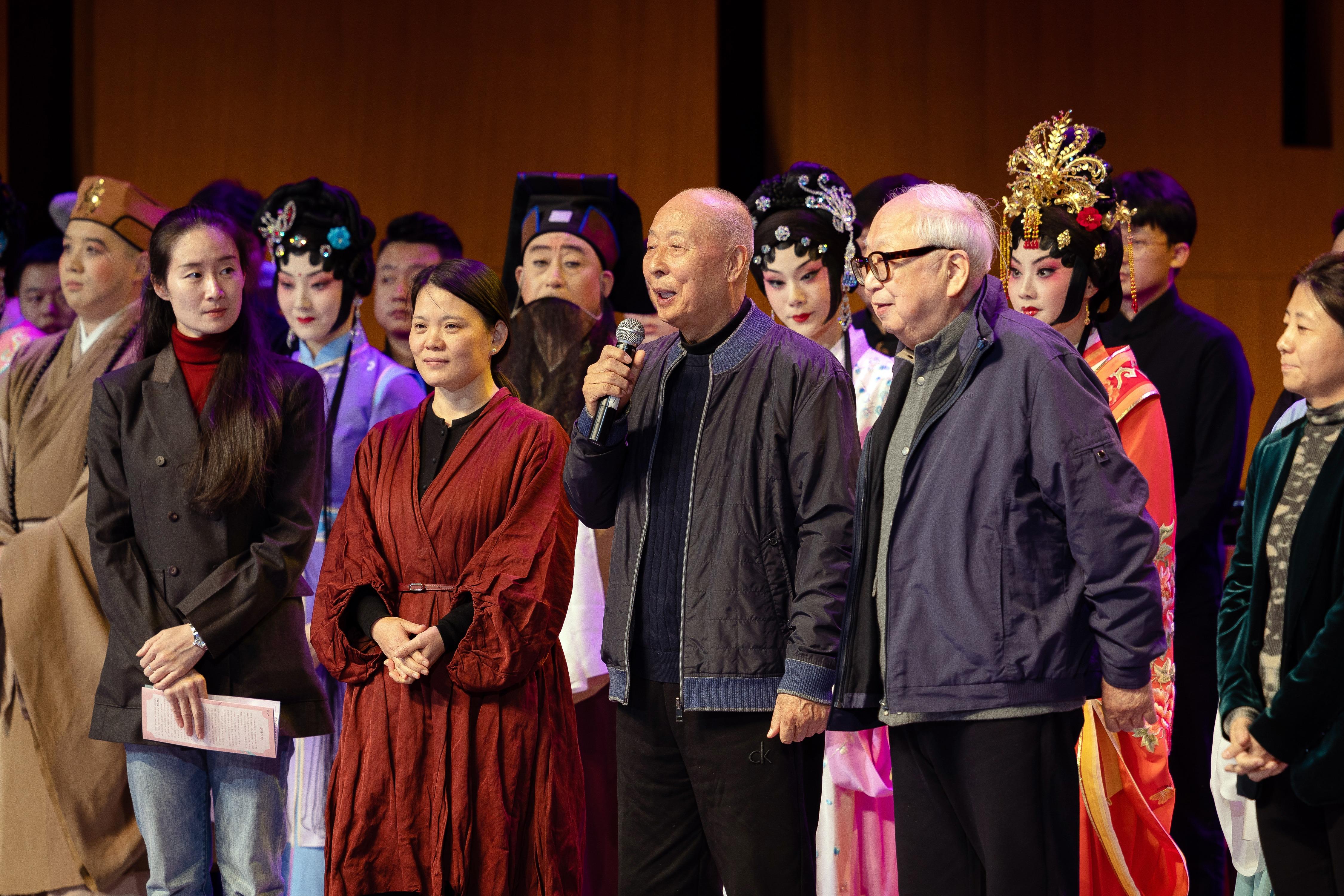 Front row, from left: Director Wang Yabin, Wei Lingzhi, secretary-general of the Cao Xueqin Society, composers Zhu Shaoyu and Wang Liping at the premiere of the concert, Jingyun Honglou ("Dream of the Red Chamber, Peking Opera-style") in 2022. (PHOTO PROVIDED TO CHINA DAILY)
Front row, from left: Director Wang Yabin, Wei Lingzhi, secretary-general of the Cao Xueqin Society, composers Zhu Shaoyu and Wang Liping at the premiere of the concert, Jingyun Honglou ("Dream of the Red Chamber, Peking Opera-style") in 2022. (PHOTO PROVIDED TO CHINA DAILY)
The Cao Xueqin Memorial Hall is one of the venues participating in the 14th Cao Xueqin Culture and Art Festival. Located at the foot of western Beijing's Xiangshan Mountain (or the Fragrant Hills), it is a scenic spot and was also Cao's former residence. It is believed that he wrote the Dream of the Red Chamber there, in a small courtyard home, with low, gray brick walls.
"In the autumn, a most beautiful season in Beijing, people can visit the Cao Xueqin Memorial Hall and the nearby China National Botanical Garden, not only to enjoy breathtaking scenery but also to revisit the novel and its characters," says Wei, referring to the festival.
The memorial hall has exhibitions telling the writer's life story, and sells products based on the novel and its characters, like tea, silk fans, notebooks and bookmarks.
There is also a Dream of the Red Chamber-themed post office where people can send postcards with images of the characters, and to popularize the novel among young children, a series of comic books has been launched.
Contact the writer at chennan@chinadaily.com.cn


